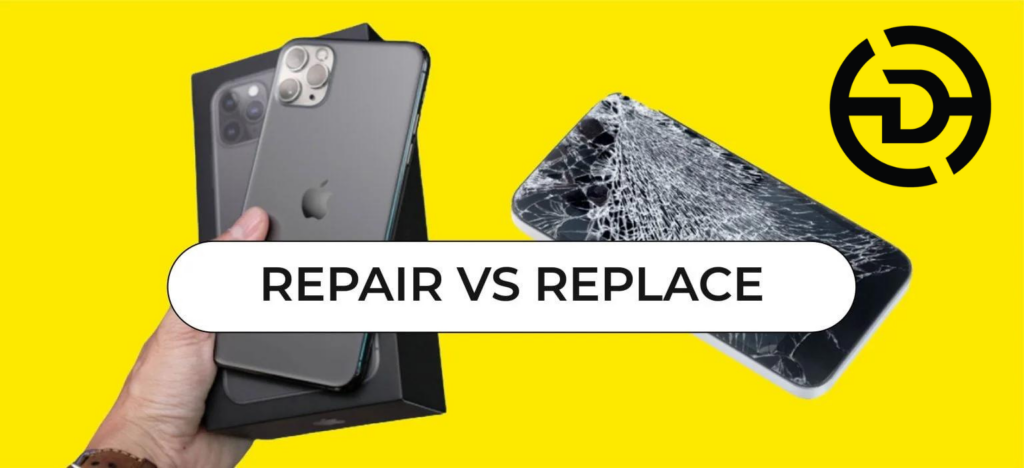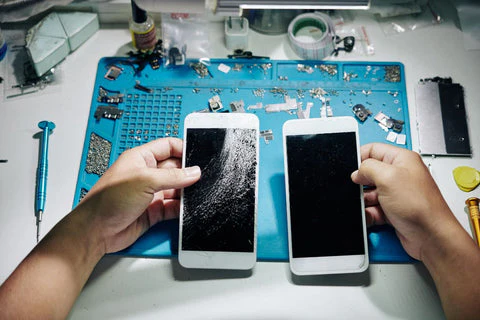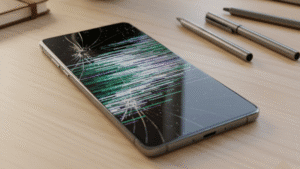Deciding whether to repair or replace a faulty smartphone depends on several factors, including the extent of the damage, the cost of repair, the age of the device, and your personal preferences. Here’s a guide to help you make an informed decision:

Factors to Consider When Deciding to Repair or Replace Your Smartphone:
- The extent of Damage:
- Assess the extent of the damage to your smartphone. Minor issues such as a cracked screen or a malfunctioning button may be worth repairing, while extensive damage to internal components or water damage may warrant replacement.
- Cost of Repair:
- Consider the cost of repairing the smartphone versus the cost of purchasing a new one. Obtain repair quotes from reputable repair shops to compare with the price of a new device.
- If the cost of repair is significantly lower than the cost of replacement and the device is relatively new or in good condition, repairing may be the more economical option.
- Age of the Device:
- Evaluate the age of your smartphone and how much longer you expect it to remain functional. Older devices may have limited support for software updates and may be more prone to hardware failures.
- If your smartphone is several years old and nearing the end of its expected lifespan, investing in a new device may provide better long-term value and performance.
- Functionality and Features:
- Consider whether the faulty smartphone meets your current needs in terms of functionality and features. If the device is outdated or lacks the essential features you require, replacing it with a newer model may be preferable.
- Conversely, if the smartphone still meets your needs and performs well aside from the specific issue, repairing it may extend its usability for a longer period.
- Warranty Coverage:
- Check whether your smartphone is still covered under warranty, as repair or replacement may be covered depending on the type and extent of the damage.
- Keep in mind that attempting DIY repairs or using unauthorized repair services may void the manufacturer’s warranty, so weigh your options carefully.
- Personal Preference:
- Consider your personal preferences and attachment to the device. If you have a sentimental attachment to the smartphone or prefer to minimize electronic waste, repairing it may be the preferred option.
- On the other hand, if you’re eager to upgrade to the latest technology or simply prefer the convenience of a new device, replacement may be the more appealing choice.
Steps to Decide Whether to Repair or Replace Your Smartphone:
- Assess the Damage: Evaluate the nature and severity of the issue affecting your smartphone.
- Obtain Repair Quotes: Get quotes from reputable repair shops to compare the cost of repair with the price of a new device.
- Consider Long-Term Value: Determine whether repairing the smartphone will provide sufficient long-term value and usability.
- Evaluate Personal Preferences: Factor in your personal preferences, attachment to the device, and desire for new features or technology.
- Weight the Pros and Cons: Weigh the pros and cons of repairing versus replacing your smartphone based on the factors outlined above.
Ultimately, the decision to repair or replace your faulty smartphone depends on your individual circumstances and priorities. Take the time to evaluate your options carefully and choose the course of action that best aligns with your needs, budget, and preferences.

Tech tantrums? We’ve got the fix! ????️ laptops ????️ to iPhones ????, MacBooks ???? to iPads, Your one-stop solution for all things digital. From laptops to smartphones, we mend them all! ???? Visit digimob.com.au for swift and reliable repairs. ????
Learn more: 7 Practical Things to Do After Cracking Your Smartphone Screen
Frequently Asked Questions (FAQs)
Is it worth repairing my smartphone if the screen is cracked?
- Repairing a cracked screen can be worth it if the damage is minor and the cost of repair is lower than the price of a new device. However, if the screen damage is extensive or if the repair cost is high, it may be more economical to consider a replacement.
My smartphone is several years old. Should I repair it or upgrade to a new model?
- When deciding whether to repair an older smartphone or upgrade to a new model, consider factors such as the extent of the damage, the device’s age, its performance, and your budget. If the repair cost is reasonable and the device still meets your needs, repairing may be a viable option. However, if the smartphone is outdated or experiencing multiple issues, upgrading to a new model may be more practical in the long run.
How can I determine if my smartphone’s repair is covered under warranty?
- Check the warranty status of your smartphone by reviewing the manufacturer’s warranty terms and conditions. If the device is still under warranty and the issue is covered, you may be eligible for free or discounted repair or replacement. Contact the manufacturer or authorized service provider for assistance with warranty claims and repairs.
What should I do if the repair cost is almost as much as buying a new smartphone?
- If the cost of repairing your smartphone is close to the price of purchasing a new device, carefully consider factors such as the device’s age, performance, and your personal preferences. Assess whether the repair will extend the device’s usability for a significant period and whether it meets your current needs. Additionally, explore options for refurbished or budget-friendly smartphones as alternatives to repair.
Can I repair my smartphone myself to save money?
- DIY smartphone repairs can be risky and may void the manufacturer’s warranty or cause further damage if not performed correctly. While minor repairs such as replacing a battery or a cracked screen may be feasible for some individuals, complex repairs involving internal components should be left to trained professionals. Consider the potential risks and weigh them against the cost of professional repair before attempting DIY repairs.


